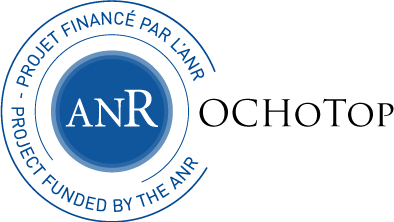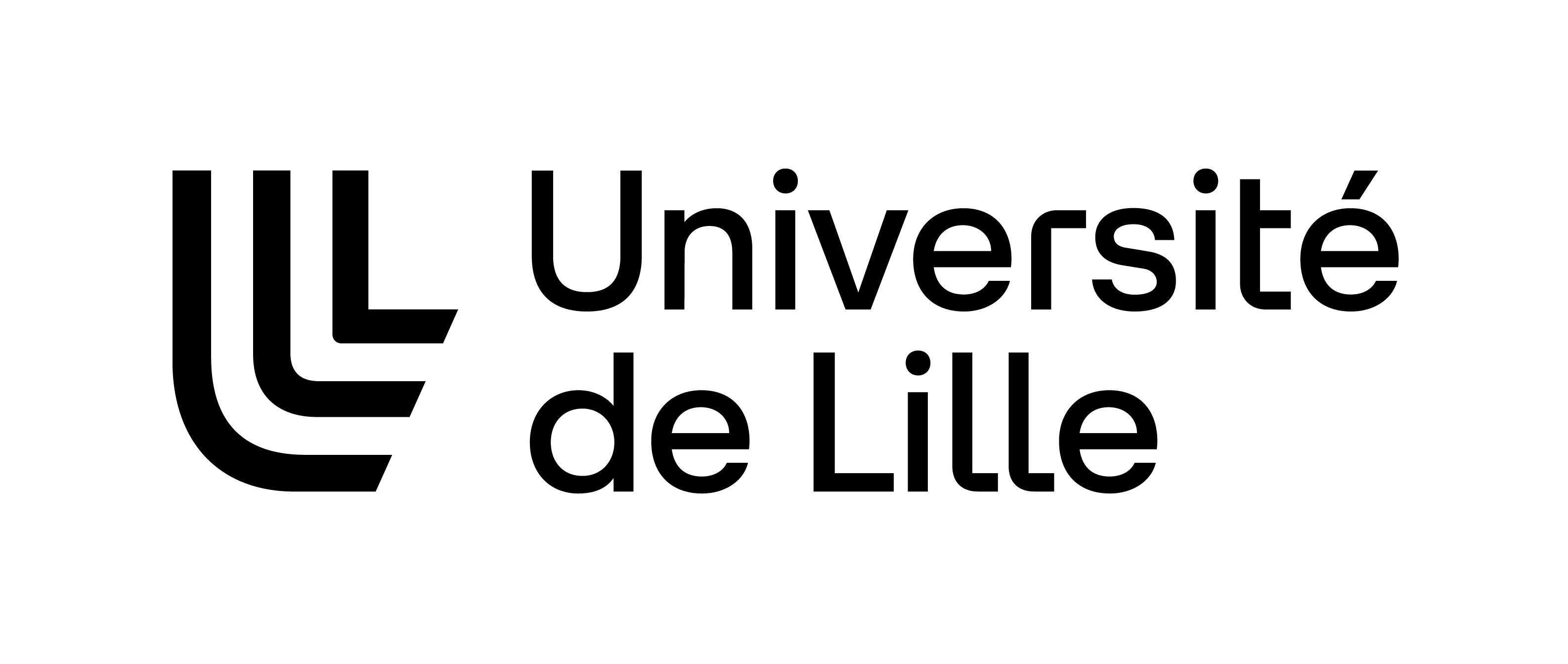FNS-ANR OCHoTop Project : activities




FNS-ANR OCHoTop Project : activities |

|

|

|

|
See the workshop Homotopical days (Nice, December 9-11, 2022), to which the members of the project have contributed, and which has served as a final meeting for the project.
Opening (reception of participants): Monday, July 5, 9:00 (UTC+2)
Closing: Wednesday, July 7, 16:30
Place: the workshop will be organized at the Laboratoire Paul Painlevé, Université de Lille, Cité Scientifique, Villeneuve d'Ascq (France), in a hybrid mode, with a part of the participants attending in person (to the extent allowed by the sanitary constraints), another part attending online.
The program comprises research talks given by invited speakers on general topics of the project and will leave plenty of time for informal discussions.
Thanks for getting in touch with the organizers by e-mail at if you wish to attend this workshop.
Monday, July 5
09:45-10:45 Nathalie Wahl (University of Copenhagen) "String topology operations"
String topology is the structure of the homology of a free loop space. I will talk about some of the string topology of manifolds we know, and about what they detect.
11:00-12:00 Mikala Ørsnes Jansen (University of Copenhagen) "The reductive Borel-Serre compactification and unstable algebraic K-theory"
The reductive Borel-Serre compactification, introduced by Zucker in 1982, is a stratified space which is well-suited for the study of L2-cohomology of arithmetic groups and which has come to play a central role in the theory of compactifications of locally symmetric spaces. We determine its stratified homotopy type (exit path ∞-category) to be a 1-category defined purely in terms of parabolic subgroups, their unipotent radicals and a conjugation action. This category makes sense in a much more general setting; in fact, we can associate such a category to any ring R and any integer n and interpret it as a "compactification" of GLn(R). We propose these categories as models for unstable algebraic K-theory and investigate them in detail for finite fields and commutative local rings with infinite residue field. This is joint work with Dustin Clausen.
14:00-15:00 Felix Wierstra (University of Amsterdam) "En Hopf invariants"
The classical Hopf invariant is an important invariant of homotopy classes of maps from S2n-1 to Sn and was historically used to show that the higher homotopy groups of spheres can be non trivial. One way of defining the Hopf invariant is by applying the associative bar construction to the cochains considered as an associative algebra with the chain level cup product. In this talk, I will give a generalization of the Hopf invariant by considering the cochains as an En-algebra and not just an associative algebra. Using Fresse's Koszul duality of En-operads, we can define an En version of the bar construction and use this to define a generalization of the Hopf invariant. We further show that there is a natural relation between the En-Hopf invariants of a map and the En+1-Hopf invariants of its suspension. This can for example be used to show that the homotopy class of a map is stably non-trivial.
15:00-16:00 Michael Ching (Amherst College) "Bar-cobar duality for En operads"
I will describe joint work with Paolo Salvatore on the bar-cobar duality of En operads in stable homotopy theory. Building on work of Getzler-Jones (for the homology of En) and Fresse (for chains on En), we prove that an En operad of spectra is O(n)-equivariantly self-dual up to a shift in dimension, via an explicit S-duality map of (unstable) operads. At the heart of our construction is a model for operadic suspension into which the Fulton-MacPherson operad equivariantly embeds. One application of this result is the construction of a model for the inverse sequence of operads given by Koszul duals of the inclusions En to En+1 which appears in my previous work with Greg Arone on Goodwillie calculus.
16:30-17:30 Peter Bonventre (Holy Cross College) "Models for equivariant operads with norms"
One surprising feature of equivariant homotopy theory is that there are many different notions of homotopy coherent commutative monoids, distinguished by the existence (or not) of certain "norm multiplications". These different structures can all be encoded by equivariant (simplicial) operads, but care must be taken to ensure the homotopy theory correctly incorporates norm information. In this talk, I will discuss joint work with Luis Periera which provides and proves the equivalence of several models for this homotopy theory, including an Elmendorf Theorem and a Nerve Theorem for equivariant operads.
Tuesday, July 6
09:30-10:30 David Reutter (Max-Planck Institut) "Even-dimensional topological field theories and stable diffeomorphisms"
A major open problem in quantum topology is the construction of an oriented 4-dimensional topological field theory (TFT) in the sense of Atiyah-Segal which is sensitive to exotic smooth structure. More generally, how much manifold topology can a TFT see? In this talk, I will answer this question for semisimple field theories in even dimensions - I will sketch a proof that such field theories can at most see the stable diffeomorphism type of a manifold and conversely, that if two sufficiently finite manifolds are not stably diffeomorphic then they can be distinguished by semisimple field theories. In this context, "semisimplicity" is a certain algebraic condition applying to all currently known examples of vector-space-valued TQFTs, including "unitary field theories", and "once-extended field theories" which assign algebras or linear categories to codimension 2 manifolds. I will discuss implications in four dimensions, such as the fact that oriented semisimple field theories cannot see smooth structure, while unoriented ones can. This is based on arXiv:2001.02288 and ongoing joint work with Christopher Schommer-Pries.
11:00-12:00 Marcy Robertson (University of Melbourne) "A topological characterisation of the Kashiwara-Vergne groups"
Solutions to the Kashiwara--Vergne equations are a "higher dimensional"' version of Drinfeld associators. In this talk we will describe the symmetry groups of Kashiwara-Vergne solutions as automorphisms of the (completed) wheeled props of "welded tangled foams"' - a class of knotted surfaces in R4. In addition, we will describe the graded Grothendieck-Teichmüller group as a sub-group of one of these symmetry groups.
14:00-15:00 Joan Bellier-Millès (Université de Toulouse) "Homotopy curved algebras"
The concise proposition d2 = 0 and its consequences, as the notion of homology, fall down when we study curved algebras. However, the latter appear in several contexts (in geometry for example) where an analog of the homotopy theory of chain complexes is required. We present a homotopical context in which it is possible to extend the bar/cobar constructions and the Koszul duality theory to curved operads. It follows a notion of homotopy curved algebras.
15:00-16:00 Ricardo Campos (Université de Montpellier, CNRS) "Lie algebroids are curved Lie algebras"
Differential graded Lie algebras have been generalised in two distinct ways: On one hand one can require them to be anchored over a space M larger than a point, on the other hand one can require the differential to square to a non-zero element given by a "curvature". Under the general philosophy that "dg Lie algebras correspond to (pointed) deformation problems" both Lie algebroids and curved Lie algebras are expected to have some relation to unbased deformations. In this talk I will introduce the relevant objects and show how one can treat them in a satisfactory homotopy context. The goal is to show that, in a precise sense, Lie algebroids over M are equivalent to certain curved Lie algebras over the de Rham algebra of M. This talk is based on arXiv:2103.10728 which is joint work with Damien Calaque and Joost Nuiten.
16:30-17:30 Ben Knudsen (Northeastern University) "Smooth structures and embedding calculus"
We ask when embedding calculus can distinguish pairs of smooth manifolds that are homeomorphic but not diffeomorphic. We prove that, in dimension 4, the answer is "almost never". In contrast, we exhibit an infinite list of high-dimensional exotic spheres detected by embedding calculus. The former result implies that the algebraic topology of knot spaces is insensitive to smooth structure in dimension 4, answering a question of Viro. The latter result gives a partial answer to a question of Francis and hints at the possibility of a new classification of exotic spheres in terms of a stratified obstruction theory applied to compactified configuration spaces. This talk represents joint work with Alexander Kupers.
Wednesday, July 7
09:30-10:30 Sophie Raynor (Macquarie University) "Modular operads, Brauer diagrams, and a graphical nerve theorem for circuit algebras"
Circuit algebras are a symmetric version of Jones's planar algebras used in the study of finite-type knot invariants. I will describe circuit algebras in terms categories of Brauer diagrams, and explain how to modify an existing nerve theorem for modular operads to obtain an analogous result for circuit algebras. Time permitting, I will also sketch how this relates to the talks by Randal-Williams and Robertson.
11:00-12:00 Oscar Randal-Williams (University of Cambridge) "Modular operads, modular sequences, and the downward Brauer category"
A modular sequence is to a modular operad as a cyclic sequence is to a cyclic operad; this notion does not seem to have been much studied. I will explain how it is related to representations of the downward Brauer category and hence, by Schur--Weyl duality, to representations of the infinite orthogonal (or symplectic) group. I will then explain the consequences of this story for the two modular operads obtained from the commutative cyclic operad by forming (i) extension by zero, and (ii) modular closure.
14:00-15:00 Joana Cirici (Universitat de Barcelona) "Filtered A-infinity structures on complex manifolds"
Dolbeault cohomology is a fundamental cohomological invariant for complex manifolds. This analytic invariant is connected to de Rham cohomology by means of a spectral sequence, called the Frölicher spectral sequence. In this talk, we will explore this connection from a multiplicative viewpoint: the main objective is to understand how products (and higher products) on de Rham cohomology behave with respect to the bigradings of the Frölicher spectral sequence. For that, I will explain a filtered version of Kadeishvili's homotopy transfer theory, which endows the cohomology of any dg-algebra with an A-infinity structure. This is joint work with Anna Sopena.
Opening (reception of participants): Monday, December 9, 9:00
Closing: Wednesday, December 11, 12:00
Place: the workshop will take place at the Laboratory for topology and neurosciences, at the Lausanne campus of EPFL - see the web page https://www.epfl.ch/campus/visitors/visitor-information/coming-to-epfl/ for general direction information and the web-page https://map.epfl.ch/ for a detailed map of the campus (talks will take place in room INM 11 on Monday, in room DIA 004 on Tuesday and in room DIA 005 on Wednesday).
The program comprises research talks given by invited speakers on general topics of the project and will leave plenty of time for informal discussions. The abstracts of the talks are available by following this link or by following the links of the titles in the provisional schedule below.
Thanks for getting in touch with the organizers by e-mail at if you wish to attend this workshop.
Monday December 9 (lecture room INM 11):
09:00-10:00 Fabian Hebestreit (Bonn) "Algebraic cobordism categories"
10:15-11:15 Emanuele Dotto (Warwick) "The relationship between Grothendieck-Witt theory and L-theory"
11:30-12:30 Magdalena Kedziorek (Utrecht) "Equivariant commutativity"
14:00-15:00 Daniela Egas (EPFL) "Model category structures and spectral sequences"
15:15-16:15 Rinat Kashaev (Geneva) "Invariants of long knots"
Tuesday December 10 (lecture room DIA 004):
09:00-10:00 Sarah Whitehouse (Sheffield) "Model category structures on multicomplexes"
10:15-11:15 Lukas Woike (Hamburg) "Derived modular functors"
11:30-12:30 Anibal Medina-Mardones (EPFL) "Revisiting Steenrod's construction: universality and effectiveness"
14:00-15:00 Julien Ducoulombier (ETHZ) "Explicit resolutions for combinatorially defined categories"
15:15-16:15 Najib Idrissi (Paris) "Models for configuration spaces of manifolds"
Wednesday December 11 (lecture room DIA 005):
09:00-10:00 Greg Arone (KTH) "On the non-commutative stable homotopy category"
10:15-11:15 Claudia Scheimbauer (TU Munich) "En-algebras, extended topological field theories, and dualizability"
|
1 January 2019 |